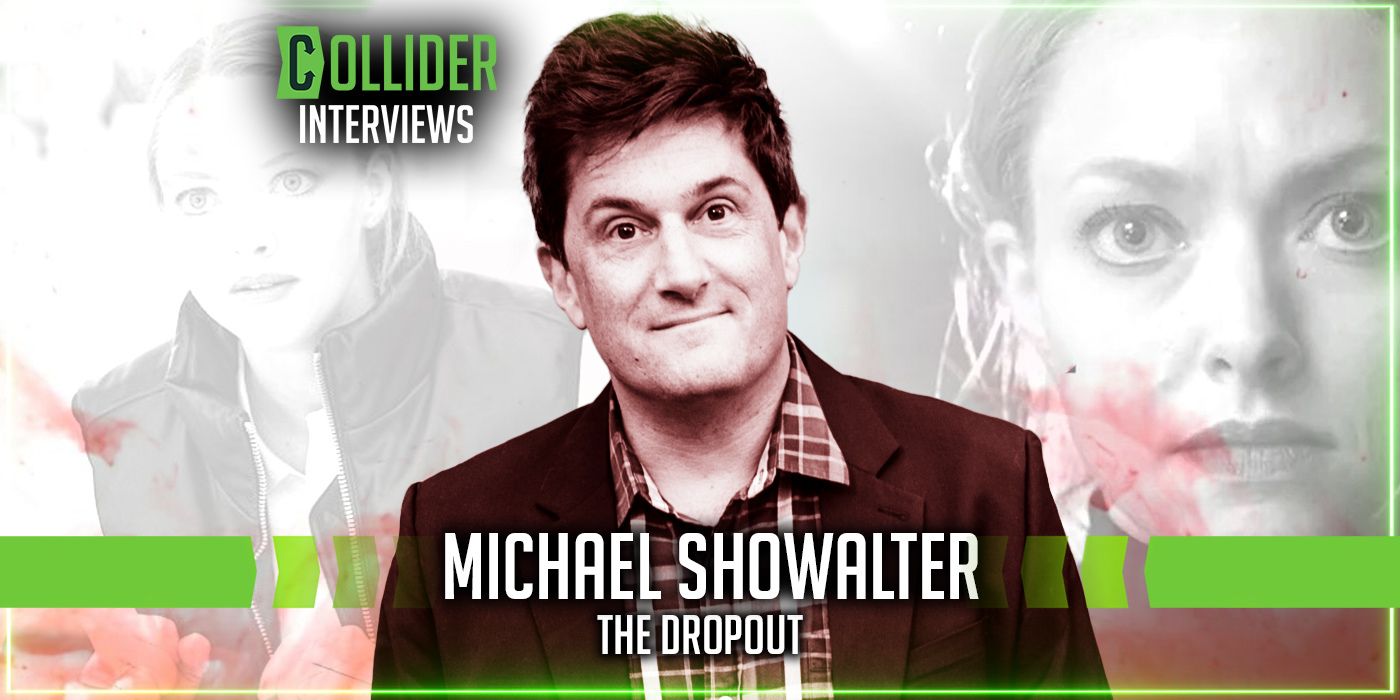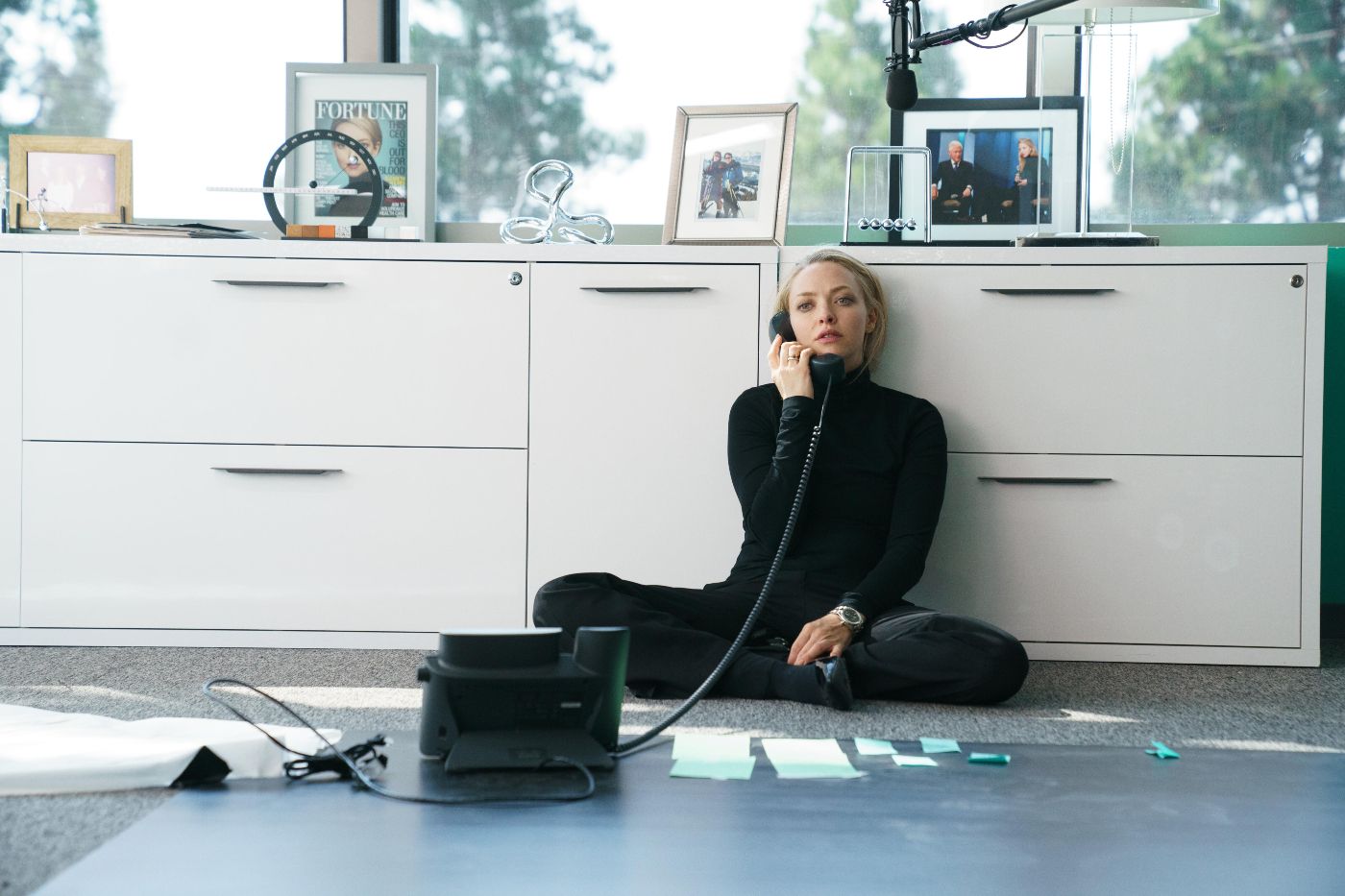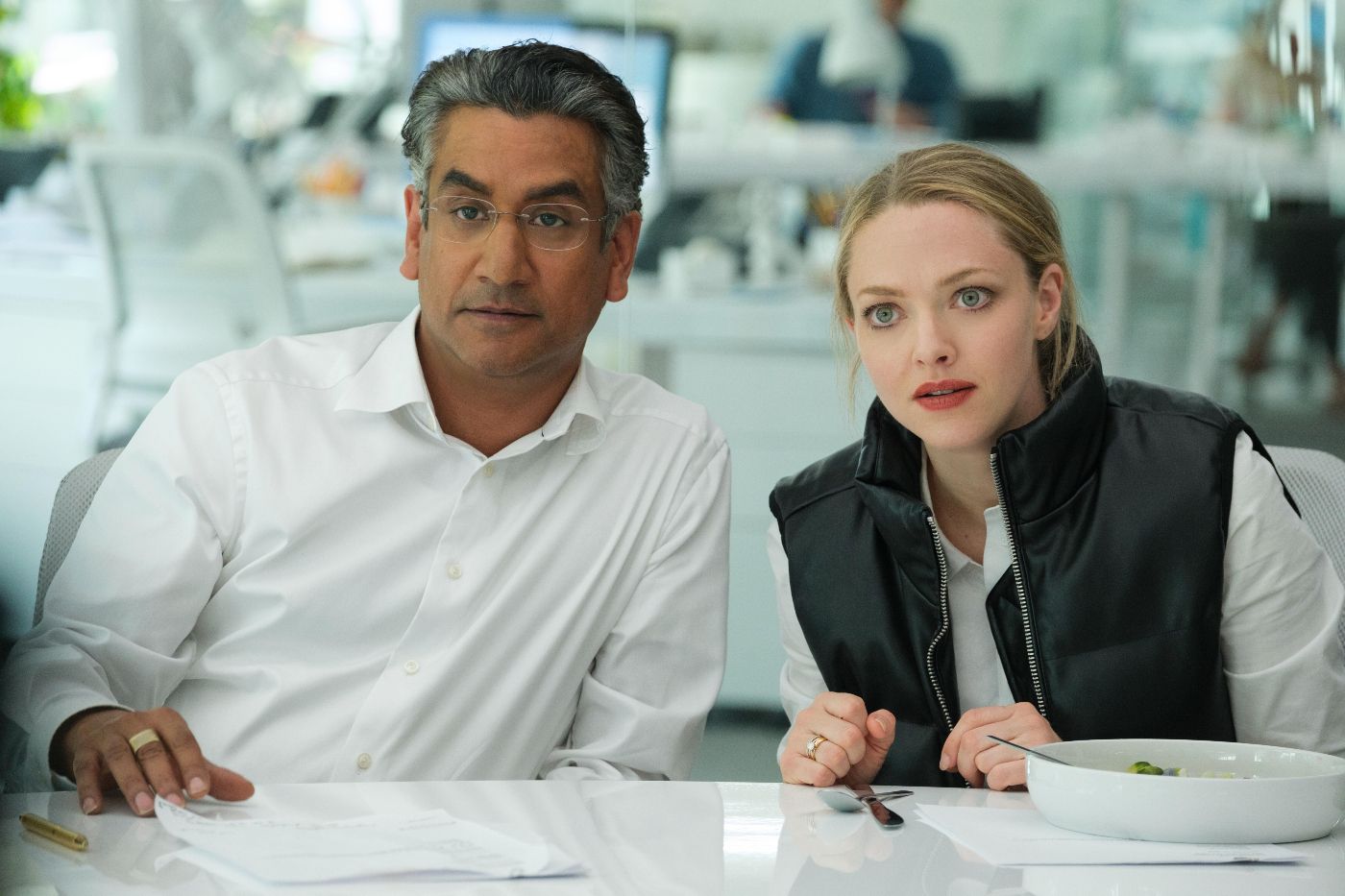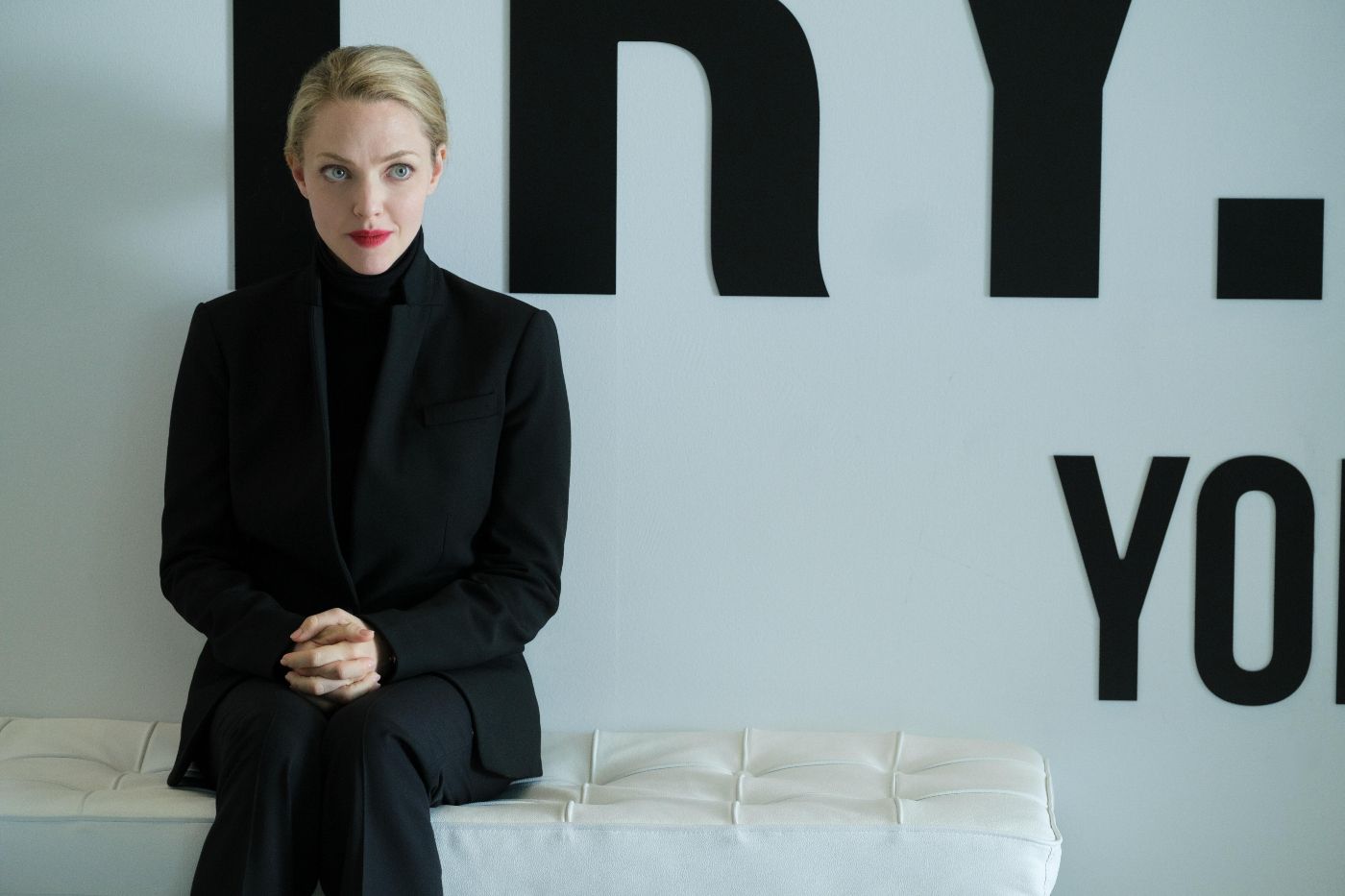The Dropout, which premieres on Hulu this week, chronicles the story of controversial public figure and entrepreneur Elizabeth Holmes and the rise and fall of her health-tech company Theranos. The miniseries documents Holmes' background, including her decision to drop out of Stanford's School of Engineering and found Theranos at the age of only 19, with the aim of revolutionizing the blood testing process through a machine that would only require a finger prick's worth of blood in order to analyze for potential diseases or deficiencies. In 2015, she was named the youngest and wealthiest self-made billionaire by Forbes, but questions about the methodology and legitimacy of her company's claims began to emerge, and by the following year, allegations of fraud caused Theranos' stock to tumble, with Holmes and fellow Theranos COO Sunny Balwani ultimately indicted on multiple counts of fraud in 2018. Holmes is scheduled to face sentencing this September.
The Dropout follows Holmes (played by Amanda Seyfried) and Theranos's ascent and downfall, and is based on the ABC podcast of the same name by Rebecca Jarvis, who also executive produces alongside showrunner Elizabeth Meriweather (New Girl). The series stars Naveen Andrews as Holmes' professional and at-times romantic partner Sunny Balwani, as well as William H. Macy, Laurie Metcalf, Elizabeth Marvel, Stephen Fry, Dylan Minnette, Utkarsh Ambudkar, Kate Burton, Alan Ruck, Mary Lynn Rajskub, Camryn Mi-Young Kim, Sam Waterston, Kurtwood Smith, Ebon Moss-Bachrach, and more.
Ahead of the show's premiere on Hulu, Collider had the chance to speak with director and executive producer Michael Showalter (The Eyes of Tammy Faye, The Shrink Next Door) about what first drew him to the series and what it was like working with Seyfried while she was inhabiting the role of Holmes. He also discussed what appeals to him about directing movies and TV shows rooted in real-life stories, being pulled in multiple directions regarding Holmes's actions, his approach to letting the narrative unfold while filming, what he hopes viewers will take away from watching The Dropout, and whether there are currently any plans for more Wet Hot American Summer sequels.
Collider: What first attracted you to this project? What made you want to helm some episodes too, to direct?
MICHAEL SHOWALTER: I mean, I just love the story. I've been following the story since I remember seeing Elizabeth Holmes on the cover of... I believe it was the New York Times Magazine, in her black turtleneck. She's going to save the world and [I remember] being like, "Wow, this is so cool," and being really taken by her. I remember Googling her and going on YouTube because I thought she was so fascinating. So I've just been a bystander of this story as it's unfolded over the years, the documentary and the podcast and the book, and just following the story. I knew that this project was out there, and I'm a big fan of Liz Meriwether and her work, and Searchlight is this studio behind it. For me, it was always, "Oh my God, I'd give anything to be a part of this project." When they came to me and sent me the scripts, I jumped at it.
Between this and Tammy Faye, it feels like there's almost a through-line with the things that you've worked on behind the camera lately. Is there something about the dramatization of real-life events that just holds a lot of appeal for you as a director?
SHOWALTER: Yeah, yeah. And The Shrink Next Door. I would say in The Shrink Next Door and The Eyes of Tammy Faye and The Dropout, there's a charismatic main character who's also very deceptive. Even The Big Sick, or the movie that I just did that's coming out hopefully next fall, spoiler alert, are based on true stories. They're autobiographical. As a consumer of entertainment, I gravitate towards true stories. In the things that I choose to watch and read and listen to, I love podcasts. I love documentaries. I love history, true crime. I find when something is real... I don't know why, but the reality of something adds a layer of intrigue for me.
Did Amanda Seyfried bring anything to the role when you were working with her that was maybe unexpected, but also proved to be successful? Anything that she brought beyond the script that surprised you in some way?
SHOWALTER: I was surprised all the time by her, the extent to which she immersed herself in the character. There would be many times when we would be shooting where she would do something that was so eerily what Elizabeth Holmes would do — in her body language, in her mannerisms, where we would be at the monitor and be like, "Oh my God. What just happened? That was really weird."
Amanda really threw herself into the role. I know that's a sort of a thing people say, but there are so many scenes... A lot of this TV show is about Elizabeth Holmes when she's by herself, these moments where we get to see her in her environment when no one's watching her, dancing or dreaming. Those are the moments where I feel like you really see some of the deepest work that Amanda brings to this character of this young woman. This young woman who's of the world, who's got all of the same kind of young impulses. Amanda really does a brilliant job of threading that needle of the ways in which Elizabeth is just a young woman in the world, and yet is slowly and intentionally transforming into another person. Watching her put that together was amazing.
I'm glad that you brought up those little moments because, for one, the episodes that you're involved in as a director really do the groundwork of establishing her backstory, the circumstances in her life that have a hand in shaping her into the person that she becomes. This is a woman that we see has been through trauma, but also has contributed to traumatic circumstances for other people. How did you try and find the balance in giving the significant parts of her past the emotional weight that they needed, but also maybe not painting her in an overly sympathetic light at the same time?
SHOWALTER: Right. Yeah. And that's the fun of the show, is that you like her. The beginning, the first couple episodes, kind of get you rooting for her and feeling for her, and she's deserving of that. But then she just makes some terrible, terrible decisions, and those decisions are motivated, probably. It's in understanding what motivates those terrible decisions that some deeper, problematic aspect of her nature comes out. It's complicated because, at a certain point, the trauma or the pain is no longer a viable excuse for some of the bad decisions that she's making. So you feel pulled in multiple directions because you sort of like her, but then you're so mad at her, and you start hating her because she's so cruel. She can be so cruel and so reckless.
In following the story, this was somebody who was able to really deceive a lot of people and pull the wool over their eyes, especially without any kind of physical evidence that this technology was going to be successful. What did you want to emphasize in terms of that Silicon Valley culture, but also her charisma and her natural ability to win people over?
SHOWALTER: For me, I think my approach to telling the story was to try to just be there. To try to put myself in the audience, right in the room, right in those situations with Elizabeth, with the other people that she was encountering — and to not judge it, to not take the position, but to just try to be there and immerse you in that world so that you've got some sense of when we all have the same question, which is "How could this have happened?"
If I can put you in the room, then maybe you might have a sense of how it could have happened, because you might know what it'd feel like to be in that sushi restaurant with all those guys from Walgreens. So I tried to just be there, and then let the actors tell the story of the characters and stuff. For me, it's more just trying to almost make the camera another person, somehow, another character in those situations who's a silent observer.
We tend to, as a society, really rubberneck at these true crime adaptations or dramatized depictions of real-world events, because these are stories that dominate the headlines. What do you primarily want people to take away from watching this show, beyond the headlines?
SHOWALTER: I hope that on some level, people are able to see that we are all somewhat responsible for this. That it would be very easy to just kind of make it all about her and just say, "Oh, she's crazy. And she's a narcissist or whatever." But we all wanted it to be true. So we're really all responsible in a way.
But also to, I think, understand that she was — and again, I'm very specific because I got my four episodes. The little chunk of the story that I was telling is, there is a part of her that's worthy, and she was a young woman trying to make a mark in a male-dominated industry, and that that's something to celebrate. Let's celebrate that she had this vision, but let's also see where her integrity went off-road. Let's see if, as a culture, we can all say that integrity should have a role and a place in the way we do business and the way we treat each other as individuals.
Before I let you go, I feel like I would be remiss in at least not asking [this] on behalf of our Collider audience. I have to switch gears a little bit.
SHOWALTER: Oh. Wet Hot?
Are there any ideas floating around for potential stories? Anything kind of kicking in the tank?
SHOWALTER: Not at this moment, not at this moment. But it's never too late. The good thing about Wet Hot is that no matter how old we get, we can always go back and play teenagers because we were already old when we did the first movies. So we could be in our sixties and still go and play camp counselors.
And Camp Firewood will never die.
SHOWALTER: Those embers will burn forever.
The Dropout premieres with its first three episodes on March 3 exclusively on Hulu, with new episodes released weekly thereafter.




